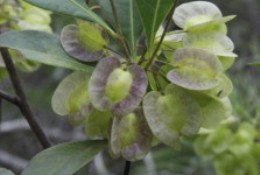28 August 2012
 A UniSA research team is using compounds extracted from an Indigenous medicinal plant to develop a natural cream to treat inflammatory skin conditions like dermatitis and psoriasis.
A UniSA research team is using compounds extracted from an Indigenous medicinal plant to develop a natural cream to treat inflammatory skin conditions like dermatitis and psoriasis.
The research is conducted in partnership with the Chuulangun Aboriginal Corporation, led by Mr David Claudie, which represents the traditional owners of the Northern Kaanju homelands in Queensland’s central Cape York Peninsula.
Dr Susan Semple from UniSA’s Quality Use of Medicines and Pharmacy Research Centre says while there are a number of anti-inflammatory creams available on the market, these medicines can have unwanted side effects in certain groups of people, such as children and people with slow-healing wounds.
The team led by Dr Semple and Mr Claudie is using compounds extracted from the Indigenous plant Dodonaea polyandra or ‘Uncha’ to develop a cream which is completely natural and has a novel mechanism of action that may allow it to have an improved safety profile.
“Compounds with this particular structure have not been isolated from a natural source before,” Dr Semple says.
“Our initial aim is to develop a cream to treat inflammatory skin conditions, but there may be potential uses for other inflammatory conditions, such as inflammatory conditions of the mouth and gastrointestinal system as well as wound healing.”
Dr Semple has been awarded a grant from BioSA for the pharmaceutical development of the work, which is supported by ITEK Ventures, the commercialisation company of UniSA.
Chuulangun Aboriginal Corporation is leading the on-country aspects of the research including collecting plant materials, examining plant distribution and numbers, and looking at the effects of plant harvesting. The Corporation is a joint applicant with UniSA on a patent concerning the anti-inflammatory components of the plant extract.
The UniSA team’s work in researching Indigenous medicines is funded through a National Health and Medical Research Council Development Grant. Dr Semple says the BioSA funding will support the pharmaceutical development of her work in a number of ways.
“The BioSA funding will allow us to isolate larger quantities of some of the active components from the plant material, which is important because we need quite large amounts of these compounds to get the necessary testing for safety and effectiveness done,” she says.
“It will also support testing of the plant extract in a model of dermatitis to determine its usefulness in this condition.”
Dr Semple hopes her work will benefit society in general with the development of new anti-inflammatory medicines.
“The aim of this project is also to benefit Indigenous traditional owners with increased knowledge about the plant and the traditional homelands in which the plant grows, through the development of sustainable harvesting and growing of plant material on the homelands.”
Dr Stephanie Agius, Commercial Manager from ITEK Ventures says it’s exciting to support the development of a natural alternative to steroids in the treatment of inflammatory skin conditions and the complementary approach of Western scientific and traditional perspectives of a medicinal plant species.
More information about ITEK can be found at www.itek.com.au
Contact for interview: Dr Susan Semple office (08) 8302 2395
Media contact: Kelly Stone office 8302 0963 mobile 0417 861 832 email Kelly.stone@unisa.edu.au




